Respiratory physician Lutz Beckert considers chronic obstructive pulmonary disease management, including the prevention of COPD, the importance of smoking cessation and pulmonary rehabilitation, and the lifesaving potential of addressing treatable traits. He also discusses the logic of inhaler therapy, moving from single therapy to dual and triple therapy when indicated, as well as other aspects of management
Legacy and new ideas fuel Taupō practice
Legacy and new ideas fuel Taupō practice
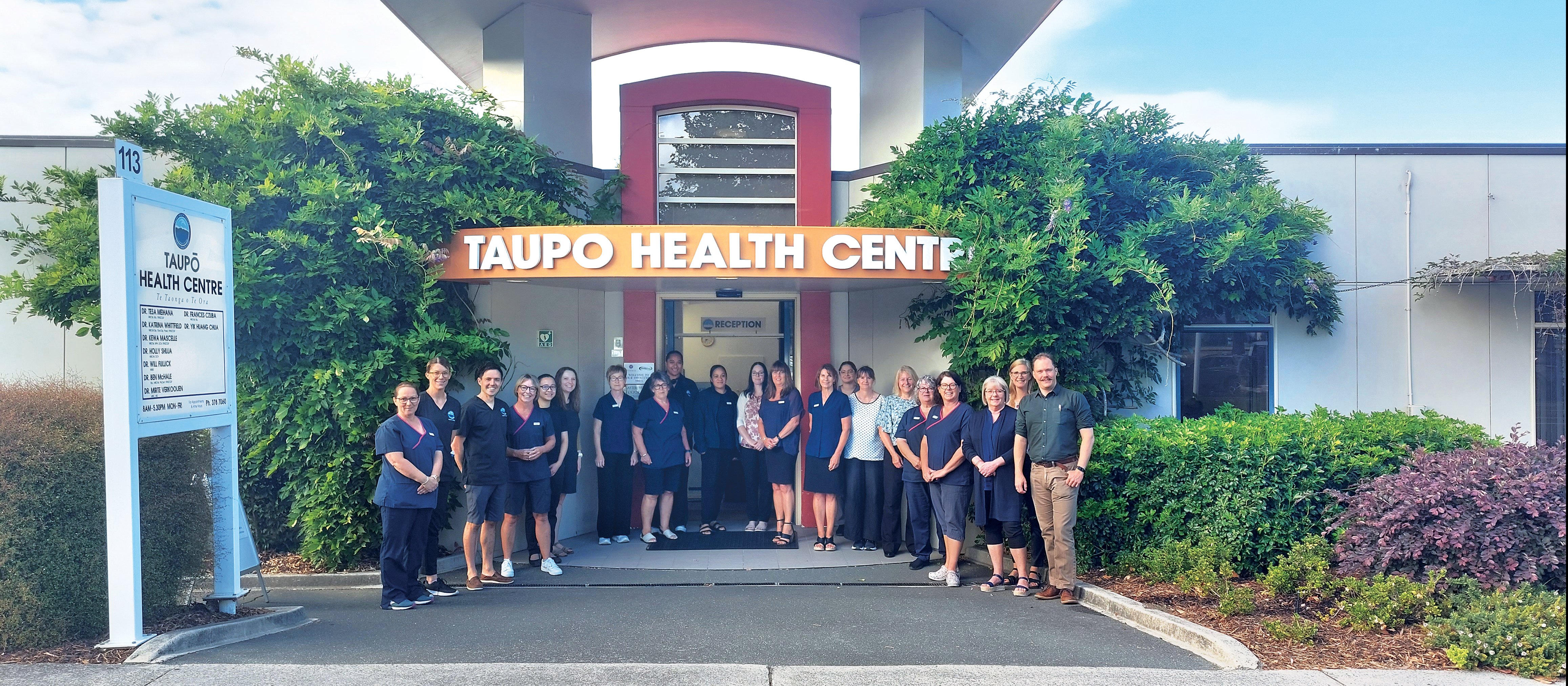
Zahra Shahtahmasebi meets the team at Taupō Health Centre, a dedicated group working to meet the needs of a diverse community
GP registrar and co-director Holly Shuja (Ngāti Porou) loves working at Taupō Health Centre. It’s a practice dedicated to its community, ranging from backpacking holidaymakers to those living in quintile four and five areas. To be a part of a team that is patient-centred and caring, not just about patients, but about each other, is a real privilege, says Dr Shuja.
In terms of longevity and innovation we’re well placed for the future
Practice manager Caroline Clarke says Taupō Health Centre started as a small practice run by three GPs about 40 years ago.
The increasing pressures and growth of the region saw the practice expand in GP numbers and building size.
It is now one of three medical centres in town, found in a purpose-built clinic on 113 Te Heuheu Street, less than 10 minutes’ walk from Lake Taupō. It remains GP-owned, with five GP co-directors.
Taupō Health Centre is regarded as a rural practice. However, although it’s part of the Ka Ora National Rural Telehealth service, the voluntary bonding scheme, and on ACC’s list of rural practices, it doesn’t receive rural funding through Te Whatu Ora, which restricts the services the practice can provide, says Ms Clarke.
Despite this, the practice offers a range of services, including lung function testing, urgent care, women’s health, travel medicine and ear clinics, says Dr Shuja.
Taupō Health Centre is open Monday to Friday from 8.00am to 5:30pm, with after-hours care available 24/7, provided on a town-wide roster with Taupō Medical Centre. In addition to virtual care, the centre is committed to providing face-to-face after hours a couple of evenings a week, along with monthly weekend shifts and public holidays.
Ms Clarke says it is now the only practice in town to do so, a testament to the changing environment and stresses on general practice overall. Community-wide health provider conversations with PHO, Pinnacle Midlands Health Network, are under way to ensure this service remains sustainable, she adds.
Pinnacle Midlands Health Network provides the practice with capitation and Very Low Cost Access funding. It also receives funding from ACC, and from the Ministry of Health for immunisations and cervical screening.
Ms Clarke says the practice has a close relationship with local iwi Ngāti Tūwharetoa, whose late kaumatua gifted them the name Te Taonga o te Ora.
Working with pau manaaki (cultural advisors) Anne-Marie and Benoir Midwood-Murray helps the practice increase cultural awareness and improve cultural safety, she adds.
Together, they have implemented audits, cultural induction sessions for new team members, and lessons in te reo Māori.
Taupō is a lovely place to live, but as a major holiday destination, its population, usually of about 26,500, can fluctuate rapidly in peak travel times, says Dr Shuja.
Ms Clarke says the practice’s policy is to see anyone it deems to need medical care in the time it has available.
The daily GP triage system running from 8am to the afternoon, as well as the urgent-care clinic, helps cope with this demand, especially casual patients and walk-ins. The wait for a standard GP appointment is generally at least two weeks, but the practice tries to keep two spaces free every day for acute cases, she adds.
To keep patient numbers manageable for its staff and space, Taupō Health Centre caps enrolments at 13,000. The practice also runs a waitlist system to bring in new people in as others leave, says Ms Clarke.
About 23 per cent of their patients are Māori, three per cent are Pasifika, and 38 per cent live in quintile four or five areas.
With Taupō a place for outdoor pursuits such as mountain biking, hiking and camping, the team sees several injuries and insect-related issues – but the rest is “pretty barn door,” says Dr Shuja, with the usual coughs, colds and flu.
However, some patients are low decile and have high needs, and so access to services, including specialists, is a big challenge. Rotorua, about an hour away by car, is the closest hospital with specialist clinics, and travel is hard for many patients.
Access to social support services, like local home-based care providers for elderly patients, those with chronic conditions or who have had an accident, can also be challenging, says Ms Clarke.
Since COVID-19, the practice has noted that general health anxiety is on the rise: “Some patients’ expectations around the provision of timely support is higher, and there seems to be a need to get health issues dealt with faster,” says Ms Clarke.
“On the flip side, we also have extremely grateful patients.”
Last year, Taupō Health Centre ran its first Hauora Day, a free drop-in service for high-needs patients that also involved other local providers including psychologists, smoking cessation and youth services. Dr Shuja and Ms Clarke note that it was an enormous success and just a “feel-good day”.
Dr Shuja would love to see changes to the general practice model to allow practices to provide appointments for the whole whānau, whereas Ms Clarke wants to tackle the centre’s size and resource constraints.
The clinic previously accommodated specialists in its rooms but ceased due to increased pressure on staff.
Ms Clarke would love to return to this: “A multi-pronged approach and space for allied health professionals so we could have all people here providing services out of one spot.”
The practice’s biggest drawcard is its inclusive team, Dr Shuja says.
“We celebrate personal achievements as much as we can in and amongst head-down working. I think it’s a really great culture here.”
The practice has about 40 staff, including nine GPs, 14 registered nurses and three medical care assistants. Eleven comprise the administration and reception team, and there is a clinical manager and practice manager.
In terms of workforce, Taupō Health Centre is relatively stable, especially regarding nurses, says Ms Clarke, but it is down in GP numbers.
“We’ve been running a long-term recruitment campaign to try to increase numbers but it’s very hard in this environment.”
The practice advertises on Seek and social media platforms, and works with recruitment agencies. Staff members consider themselves fortunate to be part of an international team, which enables them to tap into clinical networks abroad for staffing.
She adds: “We’re happily a teaching practice, and we’re ever hopeful that the next generation we help train will return to general practice.”
It’s a plan that’s paying off – Dr Shuja started at the practice in 2020, joined the GP training programme the following year, and became a partner halfway through 2022.
“Being at a practice where I was able to stay was really good because everyone knew I was learning, and they made space for that,” she says.
Dr Shuja likes the fact the centre is owned by GPs working in the thick of it. While there are challenges that come with being a doctor and a business owner, she loves the diversity both roles bring and that everyone is working towards providing healthcare that best serves the community.
When Dr Shuja first started, some GPs had been there for 30 or more years. They have since retired, making way for the five current owners, who are all aged 40 and under.
“So, in terms of longevity and innovation and energy, we’re well placed for the future,” says Ms Clarke.
Aside from the team and the patients, Ms Clarke’s favourite part of the practice is the recent addition of a mural by artist Donovan Bixby inside the waiting room: “It’s not clinically related, but it makes people smile when they come in.”
Zahra Shahtahmasebi is an Auckland journalist
TELL US WHAT YOU THINK
You can add your comments using the comment function below, or by sending a Letter to the Editor to editor@nzdoctor.co.nz

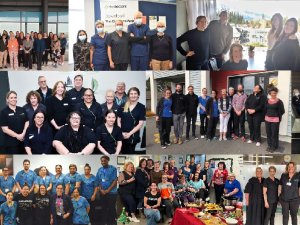
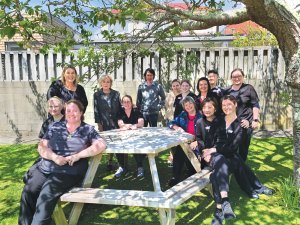

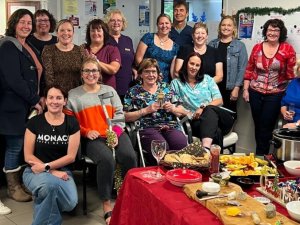
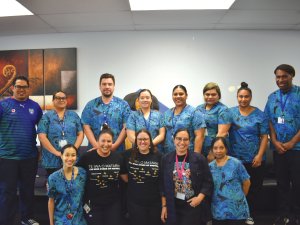
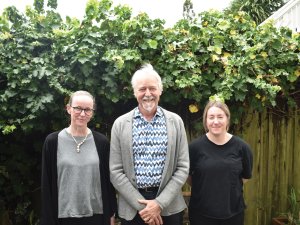
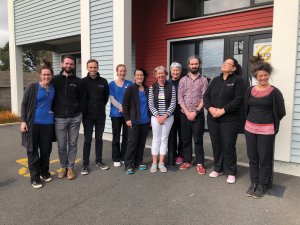

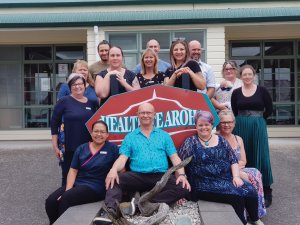
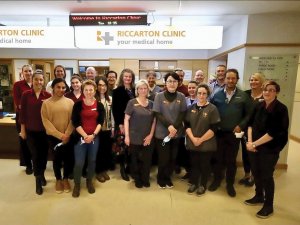
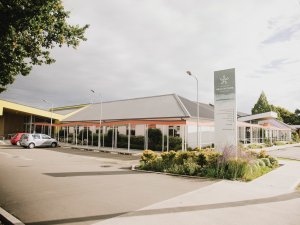
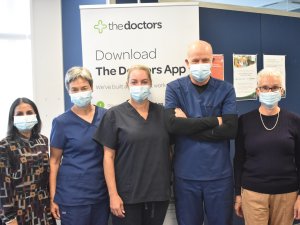
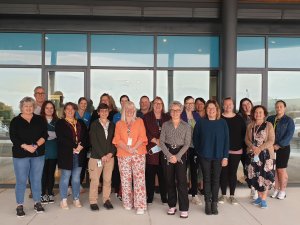
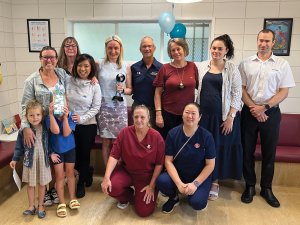



![Barbara Fountain, editor of New Zealand Doctor Rata Aotearoa, and Paul Hutchison, GP and senior medical clinician at Tāmaki Health [Image: Simon Maude]](/sites/default/files/styles/thumbnail_cropped_100/public/2025-03/Barbara%20Fountain%2C%20editor%20of%20New%20Zealand%20Doctor%20Rata%20Aotearoa%2C%20and%20Paul%20Hutchison%2C%20GP%20and%20senior%20medical%20clinician%20at%20T%C4%81maki%20Health%20CR%20Simon%20Maude.jpg?itok=-HbQ1EYA)
![Lori Peters, NP and advanced health improvement practitioner at Mahitahi Hauora, and Jasper Nacilla, NP at The Terrace Medical Centre in Wellington [Image: Simon Maude]](/sites/default/files/styles/thumbnail_cropped_100/public/2025-03/2.%20Lori%20Peters%2C%20NP%20and%20advanced%20HIP%20at%20Mahitahi%20Hauora%2C%20and%20Jasper%20Nacilla%2C%20NP%20at%20The%20Terrace%20Medical%20Centre%20in%20Wellington%20CR%20Simon%20Maude.jpg?itok=sUfbsSF1)
![Ministry of Social Development health and disability coordinator Liz Williams, regional health advisors Mary Mojel and Larah Takarangi, and health and disability coordinators Rebecca Staunton and Myint Than Htut [Image: Simon Maude]](/sites/default/files/styles/thumbnail_cropped_100/public/2025-03/3.%20Ministry%20of%20Social%20Development%27s%20Liz%20Williams%2C%20Mary%20Mojel%2C%20Larah%20Takarangi%2C%20Rebecca%20Staunton%20and%20Myint%20Than%20Htut%20CR%20Simon%20Maude.jpg?itok=9ceOujzC)
![Locum GP Helen Fisher, with Te Kuiti Medical Centre NP Bridget Woodney [Image: Simon Maude]](/sites/default/files/styles/thumbnail_cropped_100/public/2025-03/4.%20Locum%20GP%20Helen%20Fisher%2C%20with%20Te%20Kuiti%20Medical%20Centre%20NP%20Bridget%20Woodney%20CR%20Simon%20Maude.jpg?itok=TJeODetm)
![Ruby Faulkner, GPEP2, with David Small, GPEP3 from The Doctors Greenmeadows in Napier [Image: Simon Maude]](/sites/default/files/styles/thumbnail_cropped_100/public/2025-03/5.%20Ruby%20Faulkner%2C%20GPEP2%2C%20with%20David%20Small%2C%20GPEP3%20from%20The%20Doctors%20Greenmeadows%20in%20Napier%20CR%20Simon%20Maude.jpg?itok=B0u4wsIs)
![Rochelle Langton and Libby Thomas, marketing advisors at the Medical Protection Society [Image: Simon Maude]](/sites/default/files/styles/thumbnail_cropped_100/public/2025-03/6.%20Rochelle%20Langton%20and%20Libby%20Thomas%2C%20marketing%20advisors%20at%20the%20Medical%20Protection%20Society%20CR%20Simon%20Maude.jpg?itok=r52_Cf74)
![Specialist GP Lucy Gibberd, medical advisor at MPS, and Zara Bolam, urgent-care specialist at The Nest Health Centre in Inglewood [Image: Simon Maude]](/sites/default/files/styles/thumbnail_cropped_100/public/2025-03/7.%20Specialist%20GP%20Lucy%20Gibberd%2C%20medical%20advisor%20at%20MPS%2C%20and%20Zara%20Bolam%2C%20urgent-care%20specialist%20at%20The%20Nest%20Health%20Centre%20in%20Inglewood%20CR%20Simon%20Maude.jpg?itok=z8eVoBU3)
![Olivia Blackmore and Trudee Sharp, NPs at Gore Health Centre, and Gaylene Hastie, NP at Queenstown Medical Centre [Image: Simon Maude]](/sites/default/files/styles/thumbnail_cropped_100/public/2025-03/8.%20Olivia%20Blackmore%20and%20Trudee%20Sharp%2C%20NPs%20at%20Gore%20Health%20Centre%2C%20and%20Gaylene%20Hastie%2C%20NP%20at%20Queenstown%20Medical%20Centre%20CR%20Simon%20Maude.jpg?itok=Z6u9d0XH)
![Mary Toloa, specialist GP at Porirua and Union Community Health Service in Wellington, Mara Coler, clinical pharmacist at Tū Ora Compass Health, and Bhavna Mistry, specialist GP at Porirua and Union Community Health Service [Image: Simon Maude]](/sites/default/files/styles/thumbnail_cropped_100/public/2025-03/9.%20Mary%20Toloa%2C%20Porirua%20and%20Union%20Community%20Health%20Service%20in%20Wellington%2C%20Mara%20Coler%2C%20T%C5%AB%20Ora%20Compass%20Health%2C%20and%20Bhavna%20Mistry%2C%20PUCHS%20CR%20Simon%20Maude.jpg?itok=kpChr0cc)